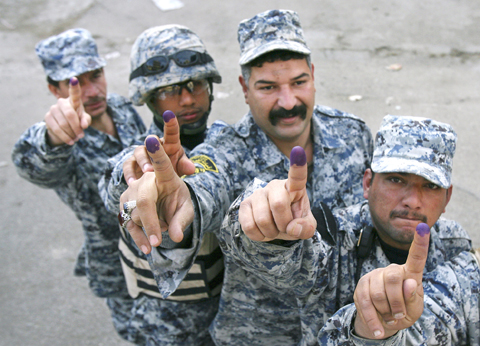Soldiers, police, prisoners and displaced people began early voting yesterday ahead of Saturday’s provincial election in Iraq, which will determine the political landscape across the country as US forces withdraw.
Iraqis held in detention were also expected to take part in the early voting.
US and Iraqi authorities hoped the election would open the political process to more groups and further erode support for extremist networks.

PHOTO: AP
In the Shiiite south, Iraqi Prime Minister Nouri al-Maliki is hoping to win support in provinces long dominated by large rival parties. In other parts of the country, Sunni Arabs, many of whom boycotted the last provincial poll, are seeking a bigger share of provincial power.
The early round of special voting was called to ensure that soldiers and police can all be on duty for a massive security operation during the main election on Saturday, when vehicles will be banned from the streets.
“This is our challenge to every terrorist and to everyone opposed,” soldier Abed Khalaf said at a polling station in the northern city of Kirkuk, where the main poll has been delayed indefinitely but troops from other parts of Iraq can vote.
“We came here today and we are not afraid, because an honest person should not hide his head from these groups,” he said.
The commander in the area, Lieutenant Colonel Khalil Kamal al-Zobaie, said his men were happy to be voting: “This day is like a wedding for all the army.”
In other parts of Iraq there were some signs of confusion.
At the Maqal Prison in the city of Basra, fights broke out between guards and reporters brought inside to film the voting. Several photographers were beaten by guards who accused them of taking pictures that showed prisoners’ faces.
Tens of thousands of displaced people were also registered for early voting, although they make up only a fraction of up to 4 million Iraqis believed to have fled abroad or to other parts of Iraq during years of fighting.
Holding a successful election is an important test of the ability of Iraqi troops to keep the peace as 140,000 US troops begin to leave. US President Barack Obama wants to speed up the pace of withdrawal after his predecessor George W. Bush promised to pull out the troops by the end of 2011.
Iraqis have embraced the voting enthusiastically. Some 14,400 candidates, including nearly 4,000 women, have registered to fight 440 provincial council seats. Campaign posters are plastered all over the concrete blast walls that have sprung up throughout the country since the US-led invasion in 2003.
The election campaign so far has not seen a surge in violence feared by US and Iraqi commanders. At least two candidates were assassinated, but overall attacks have remained at among the lowest levels since the war began.

A French-Algerian man went on trial in France on Monday for burning to death his wife in 2021, a case that shocked the public and sparked heavy criticism of police for failing to take adequate measures to protect her. Mounir Boutaa, now 48, stalked his Algerian-born wife Chahinez Daoud following their separation, and even bought a van he parked outside her house near Bordeaux in southwestern France, which he used to watch her without being detected. On May 4, 2021, he attacked her in the street, shot her in both legs, poured gasoline on her and set her on fire. A neighbor hearing

DEATH CONSTANTLY LOOMING: Decades of detention took a major toll on Iwao Hakamada’s mental health, his lawyers describing him as ‘living in a world of fantasy’ A Japanese man wrongly convicted of murder who was the world’s longest-serving death row inmate has been awarded US$1.44 million in compensation, an official said yesterday. The payout represents ¥12,500 (US$83) for each day of the more than four decades that Iwao Hakamada spent in detention, most of it on death row when each day could have been his last. It is a record for compensation of this kind, Japanese media said. The former boxer, now 89, was exonerated last year of a 1966 quadruple murder after a tireless campaign by his sister and others. The case sparked scrutiny of the justice system in

DITCH TACTICS: Kenyan officers were on their way to rescue Haitian police stuck in a ditch suspected to have been deliberately dug by Haitian gang members A Kenyan policeman deployed in Haiti has gone missing after violent gangs attacked a group of officers on a rescue mission, a UN-backed multinational security mission said in a statement yesterday. The Kenyan officers on Tuesday were on their way to rescue Haitian police stuck in a ditch “suspected to have been deliberately dug by gangs,” the statement said, adding that “specialized teams have been deployed” to search for the missing officer. Local media outlets in Haiti reported that the officer had been killed and videos of a lifeless man clothed in Kenyan uniform were shared on social media. Gang violence has left

US Vice President J.D. Vance on Friday accused Denmark of not having done enough to protect Greenland, when he visited the strategically placed and resource-rich Danish territory coveted by US President Donald Trump. Vance made his comment during a trip to the Pituffik Space Base in northwestern Greenland, a visit viewed by Copenhagen and Nuuk as a provocation. “Our message to Denmark is very simple: You have not done a good job by the people of Greenland,” Vance told a news conference. “You have under-invested in the people of Greenland, and you have under-invested in the security architecture of this